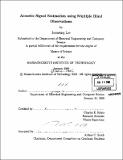Acoustic signal estimation using multiple blind observations
Author(s)
Lee, Joonsung
DownloadFull printable version (3.768Mb)
Other Contributors
Massachusetts Institute of Technology. Dept. of Electrical Engineering and Computer Science.
Advisor
Charles E. Rohrs.
Terms of use
Metadata
Show full item recordAbstract
This thesis proposes two algorithms for recovering an acoustic signal from multiple blind measurements made by sensors (microphones) over an acoustic channel. Unlike other algorithms that use a posteriori probabilistic models to fuse the data in this problem, the proposed algorithms use results obtained in the context of data communication theory. This constitutes a new approach to this sensor fusion problem. The proposed algorithms determine inverse channel filters with a predestined support (number of taps). The Coordinated Recovery of Signals From Sensors (CROSS) algorithm is an indirect method, which uses an estimate of the acoustic channel. Using the estimated channel coefficients from a Least-Squares (LS) channel estimation method, we propose an initialization process (zero-forcing estimate) and an iteration process (MMSE estimate) to produce optimal inverse filters accounting for the room characteristics, additive noise and errors in the estimation of the parameters of the room characteristics. (cont.) Using a measured room channel, we analyze the performance of the algorithm through simulations and compare its performance with the theoretical performance. Also, in this thesis, the notion of channel diversity is generalized and the Averaging Row Space Intersection (ARSI) algorithm is proposed. The ARSI algorithm is a direct method, which does not use the channel estimate.
Description
Thesis (S.M.)--Massachusetts Institute of Technology, Dept. of Electrical Engineering and Computer Science, 2006. Includes bibliographical references (p. 109-111).
Date issued
2006Department
Massachusetts Institute of Technology. Department of Electrical Engineering and Computer SciencePublisher
Massachusetts Institute of Technology
Keywords
Electrical Engineering and Computer Science.